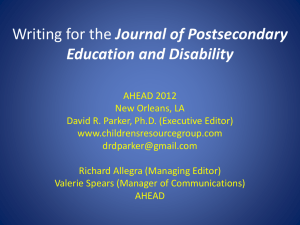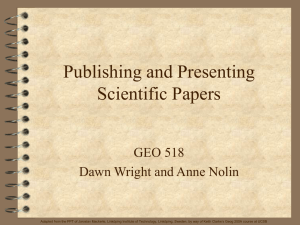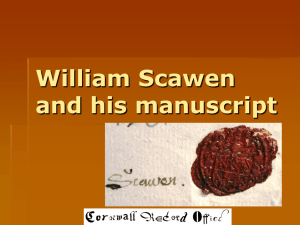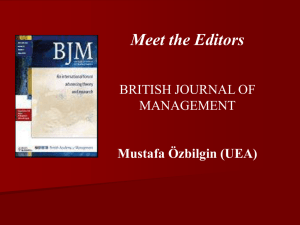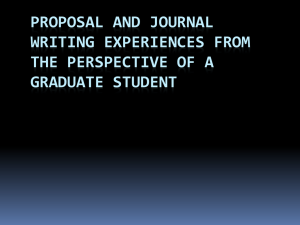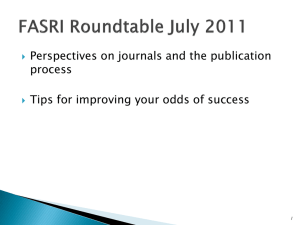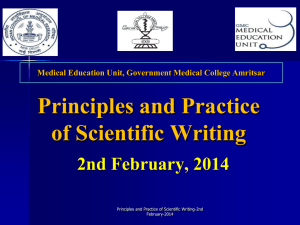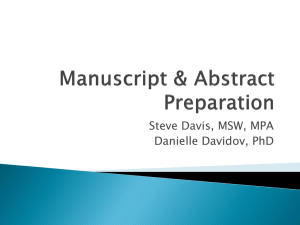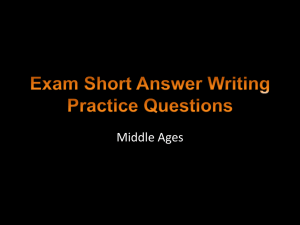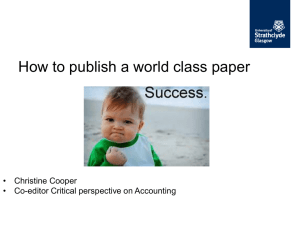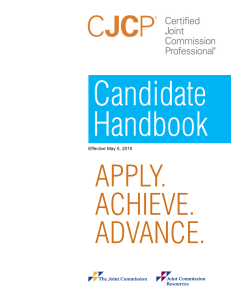Writing for Submission to the Canadian Journal of Counselling and
advertisement
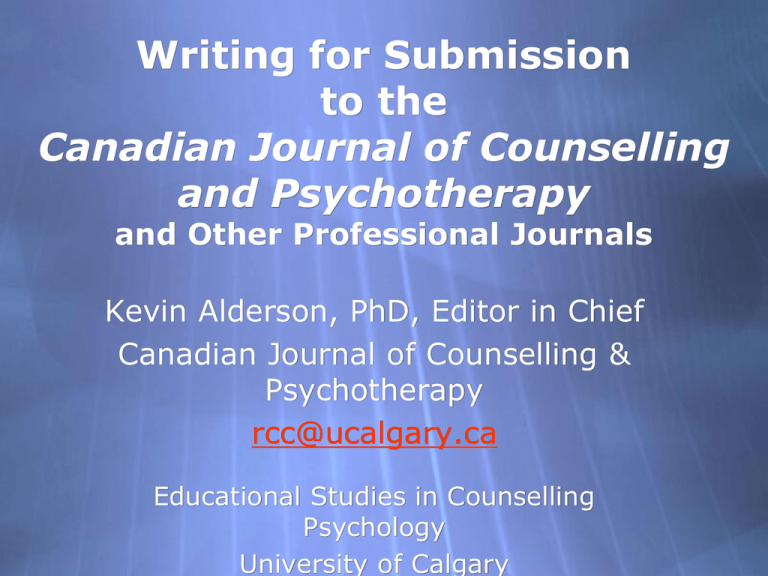
Writing for Submission to the Canadian Journal of Counselling and Psychotherapy and Other Professional Journals Kevin Alderson, PhD, Editor in Chief Canadian Journal of Counselling & Psychotherapy rcc@ucalgary.ca Educational Studies in Counselling Psychology University of Calgary Agenda Steps in Getting Published Decide on a topic Choose a journal Prepare the manuscript Submit manuscript for review Revise following feedback The Editorial Process Considerations for Students 1. Decide on a Topic If you can talk, you can write (you just need something to say) You can do it! 2. Choose a Journal Decide on a topic Choose appropriate journal Relevance of topic/research method Type of audience Editorial board composition Review process Length and style requirements Average time to process manuscripts 3. Prepare the Manuscript Check “author guidelines” Font; Spelling (Canadian vs. American); length; etc. Structure the paper Definitions; logical presentation of ideas Professional presentation APA style - Perfect! Seek out a mentor Proof read manuscript Co-authoring Choice of co-author(s) First vs. second authorship Agreement re: subsequent use of article content 4. Submit Manuscript for Review Review submission instructions Required number of copies Method of submission Submit to one journal at a time 5. Revise Following Feedback If your manuscript is rejected, you need to consider another journal. Maintain a positive relationship with the Journal. Revision (Con’t) If it needs revision (the most typical outcome), revise where this will enhance the paper and explain if you did not heed certain requests. Let the editor know where the changes were made. The Editorial Process Process can take many months Depends on topic, availability of reviewers, time of the year Initial review of manuscript by Editor: Reject outright Sent for 2 -3 blind reviews Reviewers are chosen based on Interests/Areas of specialization Preferred research methodology Editorial Process (Con't) Reviewers complete Manuscript review form Written review of manuscript Reviews are considered by Editor Accept Revise (with deadline) Reject Journal Editors Editors need: Authors Reviewers Must listen to reviewers Change in editorship of Journal likely means change in focus Accepted Manuscripts in CJCP Who owns copyright? Once accepted date of publication is usually provided Authors can get copies of their article from the Journal webpage On-line Journals Becoming more common Are considered scholarly and high quality Manuscript submission, reviewing and publishing are all conducted through Internet Allow for easier inclusion of pictures, sound, video, raw data, etc. Manuscript length is not critical CJCP is On-line CJCP became only on-line in January 2010. Ethical Issues Acknowledge others appropriately Informed consent re: research reports Recognition of study sponsors Age of data Multiple articles on same study Writing for Publication in CJCP Published articles are of interest to Counsellor Educators Counselling Practitioners Field of counselling Published quarterly by Canadian Counselling and Psychotherapy Association January, April, July, and October Distributed to over 3,000 inds.& orgs. Relevant Articles Research reports of relevance to counselling Description of new techniques or innovative programs or practices Discussion of current scientific issues Professional issues or the role of CCPA in society Relevant Articles (Cont’d) Critical summaries of published research and/or current issues related to counselling practice Brief rebuttals or commentaries Papers appropriate for Special Issues CJCP Author’s Guidelines Online manuscript submission http://cjc-rcc.ucalgary.ca/ Register as a user to obtain username and password Click on “submit” and follow instructions APA Publication manual, 6th Ed. Length of French and English articles Full length Fieldwork Brief Reports 25 pages 14 pages 10 pages CJCP Author’s Guidelines (cont’d) Require French and English Titles and Abstracts On-line submission required Special Issues Special issue proposals are submitted to Editor by potential Guest Editor(s) Can be French and/or English If approved, Guest Editor(s) prepare “Call for Papers” Guest Editor(s) manage review process Considerations for Students Writers write because they must, not because someone else (even their supervisor) tells them to . . . The wish to see your work in print must come from you, in the first instance. Writing for publication is hard work, it takes patience, persistence, and humility. H. Crago Some common problems with manuscripts Inadequate lit review (too much/little) Unclear introduction or description of the topic Inadequate description of methodology Discussion section that goes beyond or is not connected to data Three important considerations Substance - the core of the manuscript (the issue being addressed) Methodology - fully defined & described Style - editorial/writing style Calfee & Valencia, APA Where to start . . . Area of research/practice interests Involvement with a professor’s project Must have something [interesting] to say Helpful factors when writing: Co-author with an experienced professor/writer. Seek a writing mentor. Decide upon a journal and shape your manuscript around their audience and guidelines. Develop an intimate relationship with the APA Manual (or with someone who does). Get feedback from friends, family, peers, and professors. Helpful factors when writing: Work with the Editor to move your manuscript forward (if invited to do so). Take regular “time outs” (particularly after receiving the peer reviews). Difficult moments in writing: Finding the time. Length of time it takes to get a response. Managing your response to Editor/Peer review comments. Deciding how to re-write or edit the manuscript. Finding the time to rewrite. Rewarding aspects of writing and publishing: Sharing your work Connections made with others CV Places to start . . . The Practitioner’s Notebook Instructions at http://cjc-rcc.ucalgary.ca Brief reports Case studies Book reviews Watch for “Call for Papers” - Proposals I admire anybody who has the guts to write anything at all. -E.B. White Best Wishes! Email: rcc@ucalgary.ca Address: Kevin Alderson Editor, Canadian Journal of Counselling and Psychotherapy EdT 322, University of Calgary 2500 University Dr. NW Calgary, Alberta, T2N 1N4
